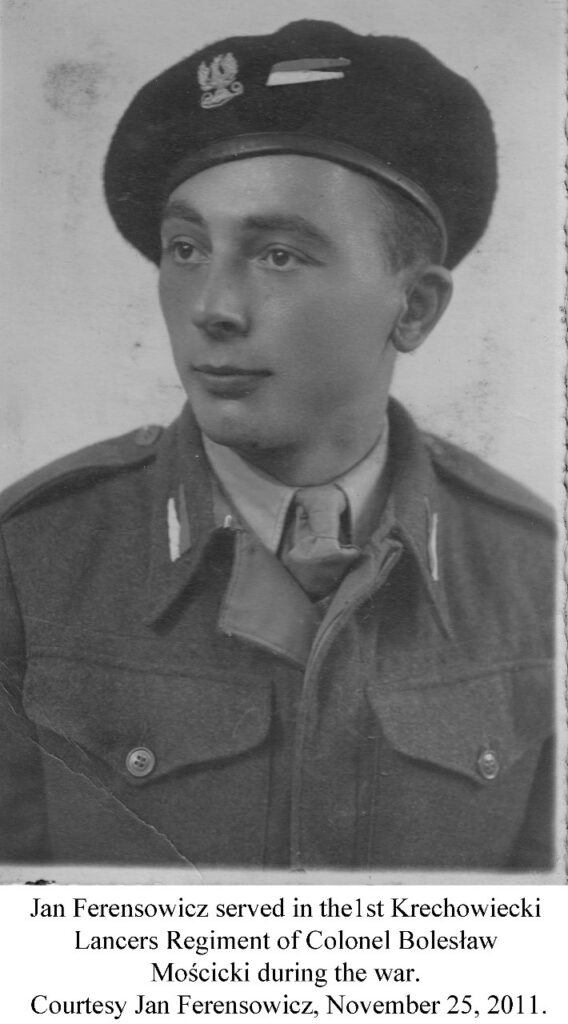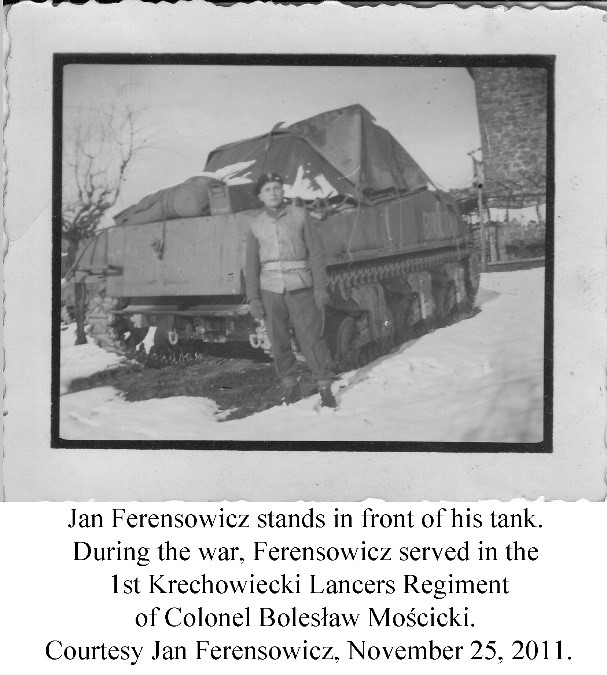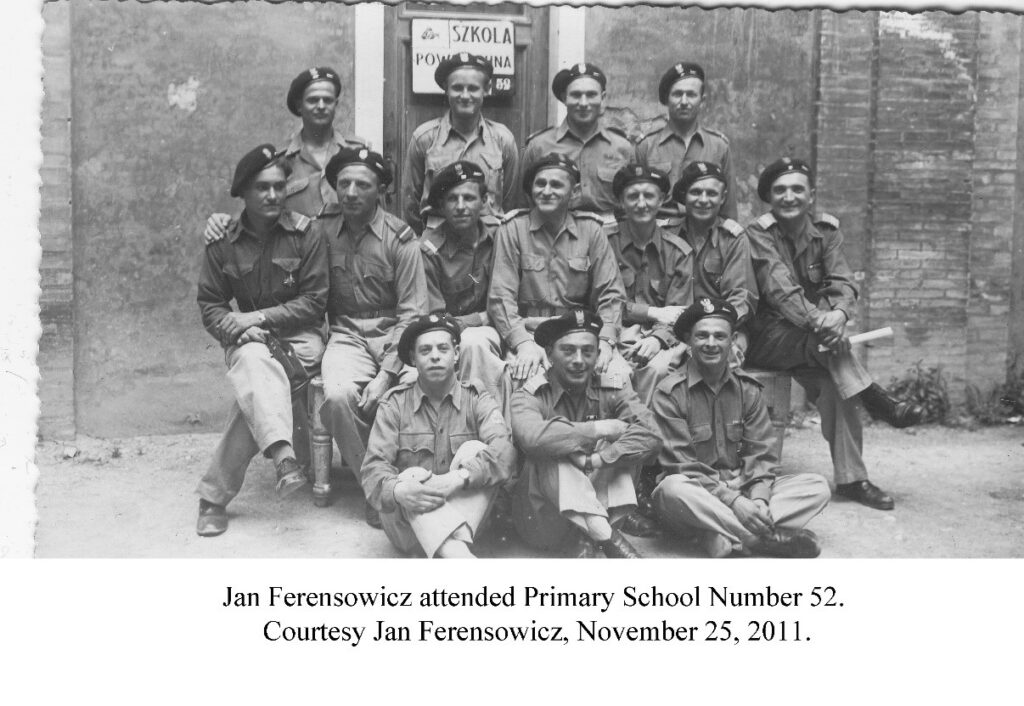Born: November 9, 1919 – Zazule (pow. Złoczów, woj. tarnopolskie, Poland)
Died: February 27, 2014 in Calgary, Alberta, Canada
Buried : Queen’s Park Cemetery, Calgary, Alberta – lot: 108, block: 14, section: RC
Family: father Karol Ferensowicz; mother Franciszka. They had four children; Józef, Jan, Antonina and Janina
Married: Janina
Children: Paul, Maria, Andrew
Military Rank: sergeant
Military Medals: For his involvement in the war effort, Jan Ferensowicz was awarded: 1939 – 45 Star (Gwiazda za Wojnę 1939 – 45), awarded in 1945; Italy Star (Gwiazda Włoch), awarded in 1945; Army Medal (Medal Wojska), awarded March 20, 1947; Commemorative Badge of the 2nd Corps (Odznaka Pamiątkowa 2 Korpusu), number 016286, awarded by Władysław Anders; Badge of the 1st Regiment of Krechowiecki’s Lancer of Colonel Bolesław Mościcki (Odznaka 1 Pułku Ułanów Krechowieckich im. płk. Bolesława Mościckiego), awarded on February 27, 1946; The Cross of Valor (Krzyż Walecznych) number 12437, awarded for participation in the Battle for Monte Cassino, on May 18, 1947; Cross of the Exiles of Siberia (Krzyż Zesłańców Sybiru) number 21-2007-249, awarded July 19 2007 by the President of the Republic of Poland, Lech Kaczyński; Medal „Pro Memoria” by Urząd do Spraw Kombatantów i Osób Represjonowanych, Warszawa, 9 January 2007. Jan Ferensowicz was promoted to sergeant (plutonowy) by Minister of Military Affairs of the Republic of Poland, signed by Jan Z. E. Berek Brigadier General (Minister Spraw Wojskowych, Rzeczypospolitej Polskiej, gen. bryg. Jan Z. E. Berek) on July 24, 1983.
Fates before joining Anders Army : Four years before the Second World War, the family of six moved to Dzwiniczanka, located sixteen kilometres from the Russian border. From 1935 until 1939, Jan Ferensowicz was a member of a paramilitary Riflemen’s Association “Rifleman” (Związek Strzelecki). On May 4, 1940, Jan Ferensowicz was forcefully drafted into the Red Army and taken to a training camp with many other Poles like him. From there, they were sent to different military units. Ferensowicz was deported with thousands of young men like him to Siberia, where he was interned in a Gulag near Gorki, where they worked on the Wołga River.
In 1942, Jan Ferensowicz was released from detention following the amnesty declared by Stalin. He travelled from Gorki to Margiełan, Uzbekistan, where he reported to one of the recruitment points where the Polish army was being formed in Kazakhstan and Uzbekistan, USSR.
Military history: Ferensowicz joined the Polish army under General Anders on December 23, 1942. This army became the Polish Second Corps and allied with the British 8th Army forces. Ferensowicz military trek took him through the Middle East and ultimately to the Battles of Monte Cassino, Ancona, and Rome, as part of the Italian campaign. Ferensowicz was in the rank of senior lancer (starszy ułan).
In March – April 1942, the Anders Army was relocated from the USSR to the Middle East. Ferensowicz was transferred from Krasnowodsk across the Caspian Sea and, after a period of recovery, to the Persian Port Pahlavi (modern Iran), occupied by the joint forces of Soviet and British Armies. For two years, Ferensowicz was stationed in Iraq, where the Polish troops underwent military training. From there, the Polish Army was transferred to Palestine and Egypt to be placed in Italy in the last months of the war. In Italy, the Anders Army fought in the battle for Monte Cassino to open the road to Rome. For his involvement, Ferensowicz received the Cross of Valor (Krzyż Walecznych). Ferensowicz was a tank driver. He participated in the battle for Bologna from April 9, 1945, until April 21, 1945. In this battle, the Polish Second Corps supported the Allied forces in capturing the city on April 21, 1945. After the war, Ferensowicz was stationed in Osimo as part of an occupation of Italy. When Ferensowicz was in the Anders Army, he had a camera and took pictures of events in which he participated. However, not many pictures survived.
Jan Ferensowicz served in the 1st Krechowiecki Lancers Regiment of Colonel Bolesław Mościcki (1 Pulk Ułanow Krechowieckich im. płk. Bolesława Mościckiego). Jan Ferensowicz military number was 1919/36/III. He served in the rank of Senior Lancer (starszy ułan). After the war, Jan Ferensowicz attended a Polish Primary School Number 52 in Italy (Szkoła Powszechna nr 52 we Włoszech).
Post-War: Jan Ferensowicz was honourably discharged from the 2nd Corps of the Polish Army, and on December 5, 1946, he joined the Polish Resettlement Corps (Polski Korpus Przysposobienia i Rozmieszczenia). As part of the Polish Resettlement Corps, Ferensowicz came to Alberta, Canada, to work on farms for two years. A document issued by the Department of Labour Canada certified that Jan Ferensowicz, P. I. No. 4435 was discharged from the undertaking made by the government of Canada. Upon finishing a two-year farm work contract on June 16, 1949, Jan Ferensowicz moved to Coleman, where he worked in the coal mines. Ferensowicz joined the Polish Combatants’ Association Number 2 in Bellevue, Alberta, on March 5, 1950. Jan Ferensowicz moved to Calgary in the early 1950s and joined the Energy Resources Conservation Board as a core handler. Ferensowicz was a founding member of the Polish Combatants’ Association Branch No. 18, a member of the Polish Canadian Congress and a representative of the Polish Government in Exile. Ferensowicz was actively involved in building the Our Lady Queen of Peace Polish Catholic Parish in Calgary. He loved his newspapers, books and dogs.
Jan Ferensowicz is survived by his son Paul (Joanna), granddaughter Anna, daughter Maria, and son Andrew. He was predeceased by his wife Janina in 1993, brother Jozef, and sisters Antonia and Janina.
author : Aldona Jaworska
source : https://mhfh.com/tribute/details/5875/Jan-FERENSOWICZ/obituary.html – obituary from McInnis & Holloway; https://discoverairdrie.com/articles/remembrance-soldiers-war-journeys-echo-through-generations; Personal interviews were conducted with Jan Ferensowicz by Aldona Jaworska in 2011. Data about Jan Ferensowicz collected by Janina Aniolczyk, member of the Polish Combatants’ Association No. 18 in Calgary, Alberta.










